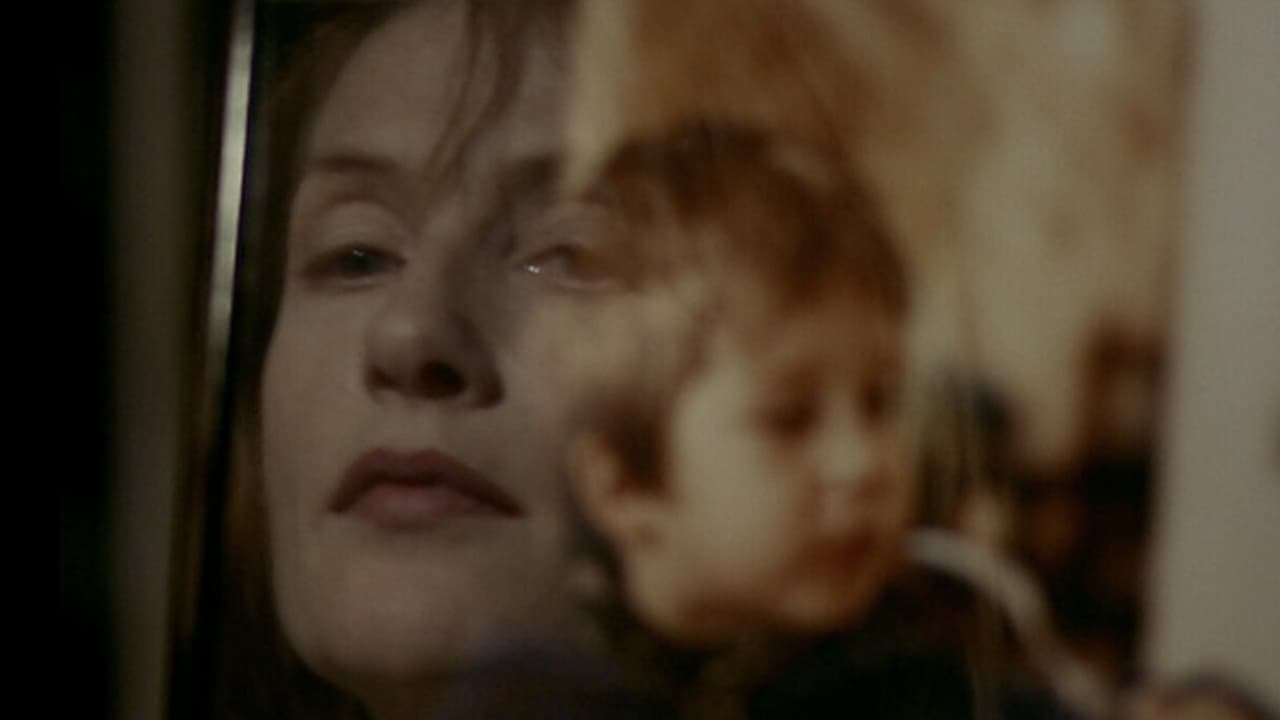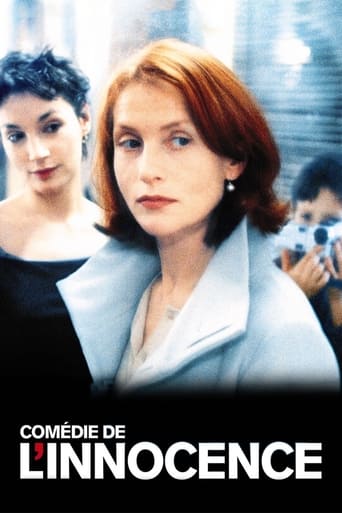



Stylish but barely mediocre overall
Although it has its amusing moments, in eneral the plot does not convince.
View MoreClever and entertaining enough to recommend even to members of the 1%
View MoreAlthough I seem to have had higher expectations than I thought, the movie is super entertaining.
View MoreThe recently deceased Raoul Ruiz was certainly an extremely idiosyncratic director, whose films did not look like anyone else's. Sometimes his experiments could go disastrously wrong ("That Day"), but other times they were fascinating to follow ("Shattered Image"). I think "Comedy Of Innocence" comes closer to the second category. I like this film....but don't ask me to tell you why! Ruiz comes close to doing for cinema what the "abstract painters" did for their art; he fills the screen with "unexplainable" (as even he himself admits) details (e.g., the rolling dice that always comes out the same) that somehow work even if you don't understand their meaning. In the meantime, the main story of "Comedy Of Innocence" is actually quite straightforward, if you pay attention to it; that doesn't mean it's not extremely weird, though! Both female leads give exceptional performances, but extra praise must go to the little boy - undeniably one of the best child performances of the last decade at least. Watch this film when you're in the mood for something you can't quite describe with words. *** out of 4.
View MoreWith this one Ruiz redeems himself well for some of the more hollow stuff he produced in the 90's. It is, as so many times before, a fiction about possible fictions as assembled in the imaginative mind. About various figments of the one mind enacting their roles in a fantasy unfolding as the unfathomable echoes bubbling in some far surface of reality.At first, it seems to be about a child intuitively guided to look for his true face, the true motherly source from which we are all outsourced at birth and to which the biological mother is only the affectionate mask. The kid is miraculously drawn to another mother, tied to the first by the strange coincidence so favored by surrealists.But it soon turns out that we are not with the child in this, rather with the discarded face of the mother. The woman drawn to her reflected image in the eyes of the kid and made whole in it. Two women as one, each the other's surrogate mother, each the surrogate daughter in turn.And then it moves again, starting with a dinner scene that reverses the one that begins the film. Now the characters have switched places, the room is dark. A film-within guides us further, footage captured by the kid in his strolls around the park. There is an imaginary friend who turns out to be real, and a madhouse in the countryhouse where only those admitted can leave at will.Then the mysterious ending suddenly seems to pull everything back into the surface of reality (we can never be sure though). Was after all the kid only the mother's helpful aid (like her brother, Serge, inside the fantasy) in recovering the husband who is away on business (imagined as an inner child, susceptible to allure of the female figure) from the imaginary hands of a deceitfull mistress? It's a fascinating ploy and the overall construct, though occasionally thin, resonates with the illusionary reality of the mind. How we weave portentous narrative around us with us center stage in the myth, what masks we choose to hide behind or let fall. Lots of Oedipus, transported to suburban France as surreal essay into the conundrums of fiction.The device is film noir. The execution is French. Not a bad thing to have, aye?
View MoreI'm beginning a serious affair with Ruiz and what an adventure it is turning into!I originally was directed to Ruiz because of my public esteem for Greenaway; several readers suggested Ruiz. Ruiz clearly comes from the Latin tradition of floating narrative, where layers and magical realities penetrate each other. Where sex and related emotions weave with intellectual perspectives. Where floating without anchors beyond the anchor of lightness itself is the very idea of life.Medem is the one I appreciate the most in this Latin world, though there are many others and I suppose the future of film now the next episode at least is in their hands. Its in the nature of this floating for some artists to fold in layers of extreme self-reference, including notions of what constitutes art, the instant artifact, and in other directions, essays on illusive realities and the charms or multilayered love.Greenaway is something a bit different. His floating is usually bipolar, between the Latin layers on one hand, soft and ephemeral and impulsive and codified frameworks on the other. Frameworks like ordering systems and symmetric containers. Cosmological and human machines for managing reality. The written word, itself dual. For Greenaway, it has to be an artifact first for him to escape the nature of artifacts.Ruiz superficially appears similar, but in fact he inhabits a whole different world. Where Greenaway registers against geometric cosmologies, Ruiz simply works within the form of French cinema. It makes him less because French cinema how to say this gently is bankrupt. Yet, like modern religions of the book, it refers to times and frames of vitality.Yet, it is a haunting notion, to bring this layered Latin floating of realities to a form that supposes that there is only one layer in life and that it is light, somewhat capricious and animated by the female urge.What we have in this film is a space where every character is creating multiple realities: each person is in control and mad at the same time. In control, because he or she creates the realities we see. Mad because they cannot control them or separate them. each of these reflects into the artifact of the film.We have the boy, who is an obsessive filmmaker, already by his ninth birthday his life and film have merged. He splits into three persons: the one his mother bore, a second one another woman had and lost and a third, Alexander, seen as imaginary by his mother.We have the mother (a theater designer and painter) from whose perspective she splits into two women, both vying for the boy who died two years ago. One reality of this woman is that she is simply floating, French-wise, though intimate peelings that reveal ever more soft a soul. Another is that she is the other woman, a violinist inmate in a madhouse where she imagines her doctor to be her brother. She sees the madhouse as the family home, the other inmates as statues. There's Serge, who the mother sees as her brother and in her other self as the psychiatrist of the madhouse. He is the fellow who sees. He blends with the boy, their toy-films are shared. It is because of Serge's lunchtime screws with the housekeeper/governess that the boy is unattended and drowns.This is the French core, sex generated folded realities. In the DVD extras Ruiz says he had to do it this way because it is "against the law" to have ghosts in French films. That young sexy girl is the fulcrum of the thing, her torso locked in throwing the dice and always getting the same number, what she calls "inverted probabilities."It isn't lifealtering stuff. But it is fine, Very fine, the house as the character.Ted's Evaluation -- 3 of 3: Worth watching.
View MoreStory about two women both trying to persuade a confused young boy that she is his real mommy'. The viewer is only shown as much as the boy's actual mother throughout the film, leaving us as confused to the reality of the situation as she.Huppert gives a great understated performance as the real mother, desperately trying to hold on to her son, who's slipping out of her grasp, and the two child performances are fantastic.The underlying anxieties of the characters boil over every now and then into some slightly chilling scenes, with the complex storyline making even the minor characters interesting to watch (in an almost film noir' style).The score seems slightly over the top' at times but this just adds to the films strange sinister feel.7.5 out of 10
View More